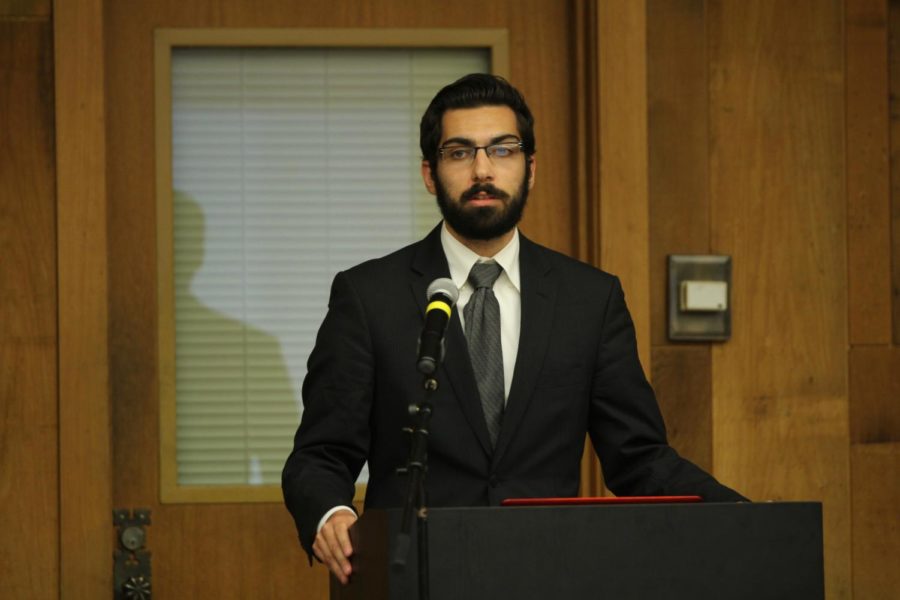- App Content
- App Content / News
- News
- News / Academics
- News / Politics And Administration
- News / Politics And Administration / Campus
- News / Politics And Administration / City
Senate recommends student activity fee increase of $2.50 per semester
Ashley Siegner/Iowa State Daily
Steven Valentino, finance director of the Student Government, speaks at the Student Government meeting on Aug. 23.
March 8, 2018
Student Government voted in favor Wednesday evening of recommending a student activity fee increase of $2.50 per semester — $5 per year.
Currently, all students pay a student activity fee of $36.75. The last year the fee increased was in 2013. In that time, enrollment at Iowa State has grown by roughly 3,000 students — student organizations growing with that number.
Finance Director Steven Valentino said that it is about time that there should be a student activity fee increase, noting that this year saw an “unprecedented amount of funding requests.”
Student Government treasurer Seth Carter backed this sentiment: “This year was definitely a wake-up call.”
Originally, the resolution was first debated by the Senate in February as a referendum on the election ballot. However, some senators felt that students would vote “no” automatically after seeing the word “increase.”
With approval by the Senate Wednesday, at minimum, no increase will be recognized until fall 2020 as the recommendation has to be approved by Special Student Fee and Tuition Committee over the summer, President Wendy Wintersteen and eventually the Iowa Board of Regents.
It is for that reason that the senators approved an amendment to the resolution that would recommend increasing the proposed fee from $2 to $2.50.
Some senators such as Cody Woodruff and Chelsea Eret were arguing against the resolution, as they felt it should have been an issue brought to the students.
“I am against this, I thought it should have been brought before the student body,” Woodruff said. “I thought it should have been voted on by them.”
Woodruff, however, additionally felt that the fee increase was not needed.
“I understand that we have been getting an influx of requests, but I don’t think the solution is funding everything they ask for. I don’t think it’s our sole duty to fund organizations as they see fit,” he said.
Eret, too, felt that requesting a fee increase is not representative of all students and that just $5 a year could make an impact on one’s finances.
“I think it would have been one thing if we put this to a referendum and it failed and then we decided to do this because we decided it was still something important to us,” Eret said. “But instead we’re just circumventing that process to do it this way.
“I don’t just think we represent who are in three clubs and need student organization money, but we also represent the students who work two jobs and don’t have time for organizations.”
In an attempt to reach a middle ground and seek additional student input, Sen. Kathryn Walker suggested to add a referendum. According to Student Government bylaws, a special election could be held to do so.
Ultimately, the Senate passed the resolution as is 21-4-2.
“This is going to help student organizations,” Sen. Sam Freestone said of the recommended fee increase.
The Senate also voted against an election resolution aimed to “uphold the standards and integrity of Student Government and its elections.”
The resolution comes after a statement released Monday evening condeming any actions that serve to “perpetrate false sexual misconduct rumors” to influence the process of the Student Government elections.
Introduced by Sen. Sam Rankin and Sen. Wyatt Scheu, the resolution, if it had been approved, would have showed the Senate’s support of Student Government’s stance on the recent sexual misconduct rumors condemning “any spread of misinformation or unsubstantiated claims.”
President Cody West said that this resolution was not needed, however, because the Student Government statement “did not just represent the executive branch” but the governmental body in its entirety.
Other senators, too, agreed and felt the resolution was unnecessary for the aforementioned reasoning.
The resolution failed with every senator voting no, except for Scheu and Rankin who abstained.
















